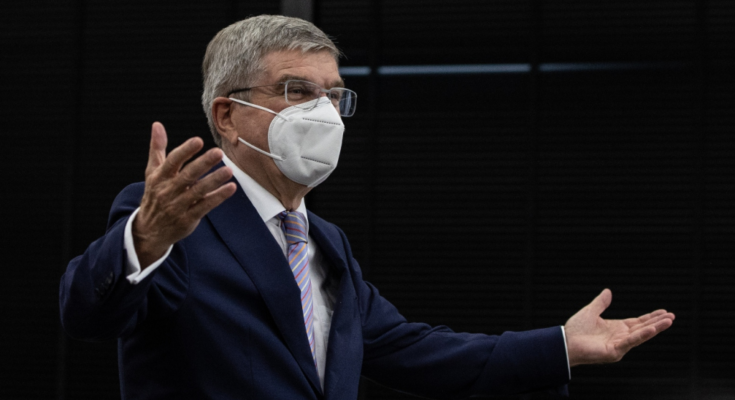The 2020 Tokyo Olympics, already deeply unpopular in Japan, have come under a fresh wave of criticism.
International Olympic Committee President Thomas Bach on Tuesday referred to the Japanese people as “Chinese” during his first public comments after landing in Japan and completing quarantine.
Bach’s speech was intended as a pep talk for the beleaguered Tokyo Games but instead became yet another source of controversy, with local critics saying the gaff was indicative of the IOC’s repeated lack of respect for the people of Japan.
The IOC president was attempting to reassure the host country, which is currently under a state of emergency amid rising delta variant COVID-19 cases, that the Olympics would not become a super-spreader event.
“Our common target is safe and secure games,” Bach said. “For everybody — for the athletes, for all the delegations and most importantly also for the Chinese people,” he went on, quickly attempting to correct himself by adding, “Japanese people.”
The live interpreters at the press conference didn’t translate the mistake from English to Japanese but Japanese media outlets nonetheless reported on the gaff. It then went viral on social media, further compounding the Games’ deep unpopularity in the country. Recent polling has showed that a sizable majority of the Japanese public want the Tokyo Olympics canceled.
Bach’s gaff follows a string of statements from IOC officials that have incensed the Japanese public and international onlookers.
During the run-up to the Games, at a moment when Japan’s medical system was under strain, IOC member Dick Pound told the press the Tokyo Olympics would take place “barring Armageddon,” and regardless of whether Japanese prime minister Yoshihide Suga explicitly asks that they be canceled.
Bach caused an additional outcry in late May by saying there was a “need to make sacrifices” (the IOC later tried to roll back his comments by insisting he wasn’t referring to the lives of Japanese people).
Last week, Japan’s Olympic organizers decided to ban all spectators from Tokyo Olympic venues, except for at a handful of smaller events taking place outside the Japanese capital. Tokyo was placed under a state of emergency on Monday, which will extend until Aug. 22. The decisions have rendered the Tokyo Games a fully made-for-TV event, with public gatherings and anything like a festival atmosphere officially discouraged throughout Japan.
Critics have argued that the Japanese people have been asked to bear all of the risks of staging the Olympics within an island nation, while the IOC and foreign broadcasters stand to reap all of the profits.
Officials estimate that 15,400 athletes will participate in the Olympics and Paralympics, which take place throughout July and August. Including coaches, family members, media, IOC staff and sponsors, the two events are expected to bring about 93,000 people from over 200 countries into Japan.
When Tokyo was awarded the 2020 Summer Olympics in 2013, organizers forecast that spectators, mostly incoming foreign tourists, would spend almost $2 billion on tickets, hotels, meals and merchandise; and that the beneficial exposure and word-of-mouth effect of the foreign influx and attention, what local economists called “legacy effects,” would generate an additional $10 billion in inbound consumer spending over the coming decade. Under current restrictions, nearly all of that anticipated economic benefit for Japan is long gone. Meanwhile, Japan and its taxpayers are estimated to have spent more than $26 billion on hosting the Games, including additional cost overruns due to last year’s postponement.
The IOC stands to profit handsomely from forging ahead with the troubled Tokyo Olympics. The organization generates almost 75 percent of its income from selling broadcast rights, and NBCUniversal, the U.S. rights holder, is the single largest source of that revenue, representing about 40 percent of the total. NBC paid the IOC $4.4 billion for the four Olympics spanning 2014 to 2020, and another $7.75 billion for the next six games running 2022 through 2032. Discovery Inc., which holds the European rights, is another major benefactor.
During an investor conference in mid-June, NBCUniversal CEO Jeff Shell boasted that the pandemic-tainted Tokyo Games were shaping up to be the “most profitable Olympics in the history of the company.”


